Deep Economy
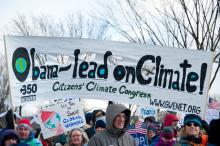
PHYSICS IS IMPLACABLE—it won’t bend even to politics.
Which is why it comes as bad news to see the charts on U.S. production of fossil fuels. During the Obama years, even as the president has been touting his administration’s success in reducing our domestic carbon emissions, it turns out that we’ve been drilling, mining, and fracking for more oil, coal, and gas than ever before. In fact, we’ve passed Saudi Arabia in oil production and are about to pass Russia in oil and gas output combined; meanwhile our coal exports have reached new highs. We’ve become the world’s biggest fossil fuel producer.
Which means that, precisely in the years when it’s become clear how much damage climate change is doing—the years of Midwest drought, of Hurricane Sandy—the United States has been bucking physics. We’re going in exactly the wrong direction.
The White House might make two arguments in response. One, it’s not their fault: The oil boom in places like North Dakota is all private enterprise. But in fact Obama’s done much to grease the skids for this boom: He’s opened up big offshore tracts for drilling, and even let the oil companies into the Arctic. His Interior Department has held auctions for vast piles of Powder River Basin coal.

IF YOU WANT to understand why the climate movement missed Tim DeChristopher when he was in jail for two years, you should read the letter he sent recently to the president of Harvard.
Drew Faust—Harvard’s first female president—had just spoken for the establishment (really, the establishment establishment) by publishing a weary, soulless letter explaining that Harvard would not divest from fossil fuels despite the request of 80 percent of its student body. DeChristopher—who was imprisoned for two years after an inspired act of civil disobedience to block a drilling lease auction in his home state of Utah—had just arrived in Cambridge to start at Harvard Divinity School.
“Drew Faust seeks a position of neutrality in a struggle where the powerful only ask that people like her remain neutral,” DeChristopher wrote. “She says that Harvard’s endowment shouldn’t take a political position, and yet it invests in an industry that spends countless millions on corrupting our political system. In a world of corporate personhood, if she doesn’t want that money to be political, she should put it under her mattress. She has clearly forgotten the words of Paolo Freire: ‘Washing one’s hands of the conflict between the powerful and powerless means to side with the powerful, not to remain neutral.’ Or as Howard Zinn put [it] succinctly, ‘You can’t be neutral on a moving train.’”
DeChristopher is exactly right. Just as a tie goes to the runner, so “neutrality” goes to the status quo. And given that we’re in a full-on climate emergency—the Arctic melted last summer, for crying out loud—this kind of neutrality is no more admirable than defending the right of poor and rich alike to sleep beneath bridges.
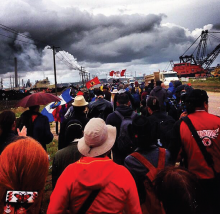
Environmental activist Bill McKibben took part in the July 5-6 Healing Walk, a spiritual gathering in northern Alberta, Canada, focused on the destruction—to the immediate environment and to the climate itself— caused by tar sands oil extraction and the Keystone XL pipeline across the U.S.
TO WALK, SLOWLY, across the tar sands complex of Alberta is to see our real-life equivalent of The Lord of the Rings’ Mordor. It really is as bad as everyone says. On this one eight-mile loop, we saw vast stretches of muskeg turned into dry, sandy desert; we saw dry-sandy desert that had been further converted into inky tailings lakes; and we were never out of earshot of the cannon that fire all day and all night to keep ducks from landing in the toxic waters. This goes on forever. The most comprehensive way to see it is from the air, I guess, but the best way to feel it is on foot.
Especially if you’re walking with the people who know this land best—have known it for thousands of years. Each year since 2010, local First Nations groups have organized a Healing Walk through the tar sands, and this year’s fourth iteration was by far the largest. Hundreds of people from around the continent camped for several days in a stretch of nearby boreal forest, held workshops and ceremonies, and then emerged for the hike through the industrial barrens.
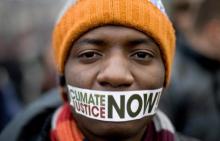
STATISTICALLY, the last couple of weeks of July are the hottest months of the year. In recent decades, the fossil fuel industry has been making them steadily hotter by burning huge amounts of coal, gas, and oil: Last year was by the far the warmest year in American history, and it came complete with biblical-scale fire, drought, and storm.
But this summer it’s the environmental movement that’s going to turn up the heat. Summer Heat is what folks are calling it: a collection of actions taking on the fossil fuel industry in every corner of the country.
Some of the action will stay focused on the route of the Keystone pipeline, but the emerging fossil fuel resistance is much broader than a single project: We’ll be at refineries and power plants and proposed coal ports, and we’ll be making clear that climate change is just part of the spectrum of damage that includes everything from air pollution to political corruption.
These battles have been led on the local level for years now by climate justice groups, by farmers and ranchers, by indigenous activists—by the folks on the frontlines of the damage from fossil fuels. But they deserve backup and reinforcement from the rest of us. And, of course, in an age of global warming, all of us are potentially on the front lines: Until Hurricane Sandy broke over their heads, most people in lower Manhattan thought the world was treating them pretty well.
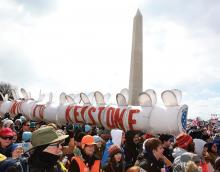
ALL I EVER wanted to see was a movement of people to stop climate change, and now I've seen it. And it looks so beautiful. It's hometown heroes like our friends in D.C. who've been fighting coal plants, and far-flung heroes like those who've been bravely blocking the Keystone XL pipeline with their bodies in Texas. It's people who understand that the fight against fracking and coal ports and taking the tops off mountains is ultimately the fight for a living planet; it's people who have lived through Sandy and survived the drought, some of whom I got to go to jail with recently.
It's the students at 252 colleges who are now fighting the fossil fuel industry head on to force divestment of their school's stock—the biggest student movement in decades. It's all of you—you are the antibodies kicking in, as the planet tries to fight its fever.
We've waited a very long time to get started, I fear. We've already watched the Arctic melt; our colleagues in 191 countries tell us daily of some new drought or flood.
Because we've waited this long, the easiest answers are no longer enough; we're going to have to make tough decisions. Our theme has to be: When you're in a hole, stop digging. Above all stop the Keystone XL pipeline. The president can do it with a single stroke of his pen, and if he does he will become the first world leader to veto a big project because it's bad for the climate. That would be a legacy—and a signal to the rest of the world that we're serious about this fight. It's his test.
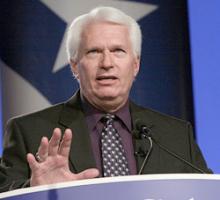
DIVINING GOD'S intent is incredibly easy—all you have to do is seek out his representatives here on earth, like Bryan Fischer, director of "issue analysis" for the American Family Association, "where he provides expertise on a range of public policy issues."
Indeed, Rev. Fischer speaks for the Lord on any number of topics (badness of gay people getting married, badness of Barack Obama who nurtures a "hatred of the white man," badness pretty much of anything that's changed since Fischer was born in 1951). But in the autumn, he offered the authoritative assurance that there was one thing God thought was really, really good: fossil fuel.
Fischer said that not using all the coal and gas and oil we could find was an affront to God—it would hurt God's feelings. In fact, he offered an analogy: Once "I opened up a birthday present that I didn't like, and I said it right out, 'Oh, I don't like those,'" he explained. "And the person that gave me the gift was there. And it just crushed that person. And you think, that's kind of how we're treating God when he's given us these gifts of abundant and inexpensive and effective fuel sources," Fischer added. "And we don't thank him for it and we don't use it. ... You know, God has buried those treasures there because he loves to see us find them."
That's really top-notch theology, as other similar top-notch theologians would attest. Dr. Calvin Beisner, for instance, is a founder of the Cornwall Alliance, the premier faith-based climate-change-denial operation on the planet. Sharing the microphone with Rev. Fischer, Rev. Beisner pointed out that not burning fossil fuel is really "an insult to God"—and that Jesus, too, wants us burning coal. If we didn't take advantage of all the flammable rocks on the planet, Beisner said, we would be like the "wicked and lazy steward" who was given talents by his master but simply buried them.

IF IT WASN'T the year from hell for the North American continent, it was the year from a place with a very similar temperature.
It's hard to remember, but it began with that bizarre summer-in-March heat wave that meteorologists described as one of the most anomalous weather events in the country's history. Before long there were record blazes burning in Colorado and New Mexico, and then a stifling heat wave moved east, triggering a "derecho" storm that raced almost 1,000 miles from Indiana to the Atlantic and left 5 million without power. July was the hottest month ever recorded in the United States; it was also when drought descended full force on the Midwest, stunting corn and soybeans and driving the world price of grain up by 40 percent (and making sure our hellish year became traumatic for poor people the planet round). By August it was clear we were in for a record melt year in the Arctic; when the long polar night finally fell, it was clear we'd essentially broken one of the planet's biggest physical features. And all that was before Sandy piled into our greatest urban area, leaving behind an indelible image of the future.
So the question becomes, what's an appropriate response? What even begins to match the magnitude of the trouble we face? What doesn't seem like spitting in the wind?
My sense is that the time has come to take on the fossil fuel industry itself—not the members of Congress they buy in droves each election season, but the real powers. Ignoring the damage they've already caused, these people spend hundreds of millions of dollars each day looking for new fossil fuels. And they spend hundreds of millions each year making sure no government stops them. They're like the tobacco industry at this point, except that instead of going after your lungs they're going after the lungs of the planet.
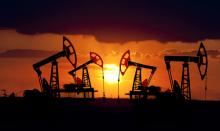
“LOTS OF COMPANIES do rotten things in the course of their business—pay terrible wages, make people work in sweatshops—and we pressure them to change those practices,” says veteran anti-corporate-abuse leader Naomi Klein. “But these numbers make clear that with the fossil-fuel industry, wrecking the planet is their business model. It’s what they do.”
The numbers she’s referring to are straightforward—they were first put forth in a report by a group of U.K. financial analysts a year ago, and they’ve now begun to seep into the debate about climate change. They show that if we have any hope of keeping the increase in global temperature below the 2 degree Celsius line (a goal so conservative that even the U.S. and Chinese governments have embraced it as their target), we can only emit 565 more gigatons of carbon dioxide. But the fossil-fuel industry, it turns out, has 2,795 gigatons worth of carbon in its inventory—that is, five times what it would take to run the Genesis creation story backwards.
In other words, this is not a case of “bad business practices.” It’s not like Apple paying bad wages or making workers use dangerous chemicals. Those are deplorable, and correctable—they’re what the boycott or the shareholder resolution was invented for. That’s how we’ve fought everything from grape growers to sweatshops.
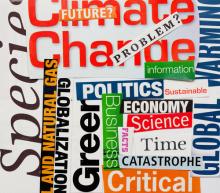
IN EARLY JUNE, a team of prominent biologists, ecologists, paleontologists, and climatologists published a long article in our most important scientific journal, Nature. It concluded that people have so disturbed the operations of the planet that it is nearing—perhaps within decades—a “state shift” to a new biological paradigm unlike any human civilization has ever encountered.
“It really will be a new world, biologically, at that point,” warns Anthony Barnosky, professor of integrative biology at the University of California, Berkeley, and lead author of the study. “The data suggests that there will be a reduction in biodiversity and severe impacts on much of what we depend on to sustain our quality of life, including, for example, fisheries, agriculture, forest products, and clean water. This could happen within just a few generations.”
For many of us who have long studied these questions, there’s nothing that surprising in the conclusions. I mean, we’ve already put enough carbon in the atmosphere to melt 40 percent of the summer sea ice in the Arctic, to make the ocean 30 percent more acidic, and to turn the atmosphere 5 percent wetter, thus loading the dice for drought and flood.
What’s surprising is not the science. It’s the endless lack of reaction to it. The secular press barely covered the Nature study—The New York Times discussed it in a blog post, not in the paper. And I didn’t hear any reaction at all from the nation’s clerics, though it strikes me this kind of story strikes much closer to the heart of our theology than most of the things we do hear clerics opining about. Contraception? Okay, sort of, you can kind of find something about it in the Bible. Homosexuality? The occasional passing reference. But the whole first page of the thing is about nothing but creation, the fact that God made everything around us, pronounced it good, and told us to take care of it.
Of the many gifts that the 99 percent award to the 1 percent—the various tax breaks and tributes that have helped push inequality in America to record levels—none are quite as annoying as the subsidies awarded the fossil fuel industry.
Vermont Sen. Bernie Sanders introduced a bill this spring that would trim $20 billion a year from those payouts to coal and oil and gas companies. Barack Obama, modest almost to a fault, has identified $5 billion in handouts that he’d like taken away before this year’s budget is finalized. Whatever the number, the principle is crucial. Because if we can’t agree not to subsidize the fossil fuel industry, I’d submit we pretty much can’t agree about anything.
For environmentalists, few things could be more important. Worldwide, it’s estimated that global warming emissions could be cut in half if all governments stopped subsidizing fossil fuel—something that won’t happen unless the U.S. takes the lead.
But let’s say for the moment that you don’t care about climate change. Let’s say you agree with Republican Sen. James Inhofe of Oklahoma that global warming is impossible because it says in Genesis “that ‘as long as the earth remains there will be seed time and harvest, cold and heat, winter and summer, day and night.’ My point is, God’s still up there,” Inhofe said. “The arrogance of people to think that we, human beings, would be able to change what He is doing in the climate is to me outrageous.” (I can’t help myself: This is an exceedingly dumb theology. God allows war but prevents carbon emission from heating the atmosphere?) Even if you thought that way, you’d still want to keep the federal government from paying Exxon bonuses every year.
Corporations want to store up treasure on earth — that's their whole, entire, complete, and utter point.
There are many things they seemed to hold in common, not least an instinctive nonviolence, contrasting so sharply with the police, who so often let the logic of force drive their actions (they found out, as often in history, that the logic that works with criminals doesn’t really apply to idealists).
The real work has been done for years by indigenous leaders on both sides of the border.
This may be the largest use of civil disobedience yet around global warming.
Fracking is just one more way to keep from coming to terms with our addiction to fossil fuel.

The fossil fuel industry is the main impediment to real change. Why? Because they are making money. Exxon made more money in 2009 than any company in the history of money.
We need to clear the polluted political air before we'll have a real chance to clear the actual atmosphere.
Nonviolent civil disobedience has been a less effective tactic in this country in the past few decades for a variety of reasons, the most important of which is probably that our woes are more complicated than in an earlier age. If there’s an exception to this rule, it's the issue I've spent much of my life working on: climate change.
True, climate change is rooted in complex science, but at this point the mechanisms are pretty clear: Burn fossil fuel and wreck the planet. It carries a strong moral edge: The people who burn the least suffer the most. And there are a series of relatively obvious villains: oil and coal barons, who not only profit from the carbon but use their proceeds to foul the debate with endless propaganda.
Since campaigners have in many cases changed their own lives, and tried for two decades the obvious tactics, such as legislative advocacy, without result, maybe the time has come to heighten the stakes, with mass action at the most obvious sites, from coal-fired power plants to corporate headquarters and congressional offices. Indeed, brave people have already begun: More than 100 were arrested, for instance, in a recent D.C. protest about mountaintop removal coal mining.
But using this tactic effectively will require some other changes.
The summer's weather can safely be described as biblical, in the sense that newspaper writers generally use the word -- that is, loud, scary, and dangerous.